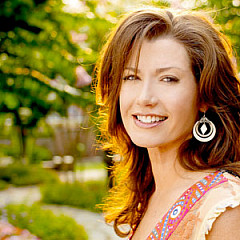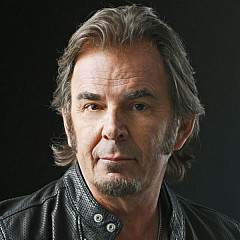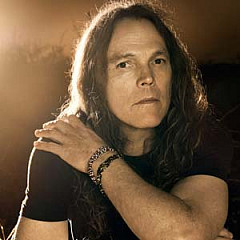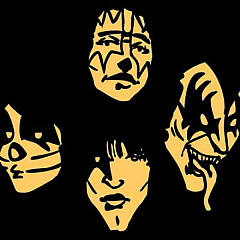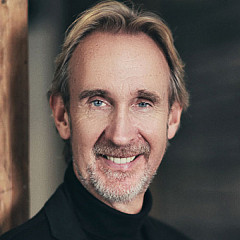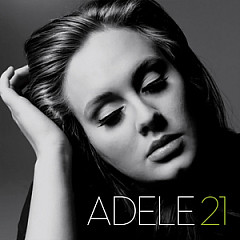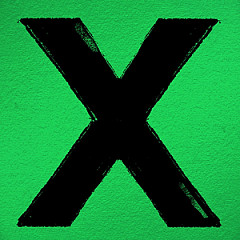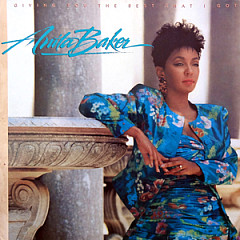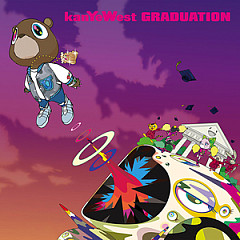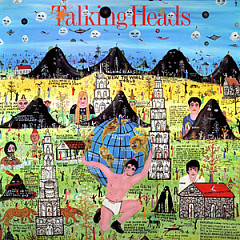10,000 Maniacs carried on with Mary Ramsey at the helm. The band has released four studio albums post-Merchant, the latest in 2015 with Twice Told Tales, a collection of British folk songs.
In this discussion with their bass player and founding member Steven Gustafson, he covers the history of the band (including the night they got ejected from their own show) and explains how they have kept the music playing without Merchant.
 Carl Wiser (Songfacts): What was your musical background? I read that you had never picked up a bass when the band formed.
Carl Wiser (Songfacts): What was your musical background? I read that you had never picked up a bass when the band formed.Steven Gustafson: My parents were big music fans and listened to records often. Lots of big band stuff and Peggy Lee, Dean Martin, Sam Cooke,Harry Belafonte. My first favorite song that I remember was "Sixteen Tons" by Tennessee Ernie Ford. I was 6 years old when the Beatles played on Ed Sullivan and I had two older sisters who loved the British Invasion. Herman Hermits, The Rolling Stones. We wore those records out.
The first 45" single I bought with my own money was "Your Song," by Elton John. David Bowie released "Young Americans" when I turned 18 my senior year in high school. I loved that record.
My parents always encouraged my musical delights and never balked at spending money on instruments for me. When I was 12 I discovered, in our basement, a 1930s 4-string Gibson Tenor guitar that belonged to my grandfather. I bought new strings and an Ernie Ball Tenor Guitar music book and learned to play chords on it. My neighbor friends had guitars and their older sister taught us to play church folk songs. "Michael Row The Boat Ashore" and stuff like that. We had a nursing home at one end of our street and a school playground at the other, so that was our summer circuit. The residents at the nursing home tipped us and gave us cookies. We played at the school playground to be cool. I wanted to be in the junior high concert band and my dad said he would buy me any instrument that wasn't a violin or drum so I picket trumpet. I was last chair, third section.
I saw my first live rock and roll band at a junior high school dance and was mesmerized by the live energy. In high school I got the acting bug and participated in two musicals and three plays. There were a lot of girls in the shows but the best part was getting that standing ovation at the end of the night. I had a 12-string Penco guitar that my parents bought me and I would charm my girlfriends (or try to get girlfriends) by playing songs I knew. In 10th grade homeroom I met Dennis Drew, a jock from the north side of town. We became friends through our shared interest in Neil Young and Bob Dylan. Dennis played piano, so I would take the crosstown bus to his house and we would warble Dylan and Young till dinner. In college Dennis and I were running the school's 10-watt non-commercial FM radio station in 1977 and we started getting these cool records from The Sex Pistols, The Clash and the Talking Heads. That year The Ramones played in Jamestown and 2-3 sprouted up from that big bang.
In 1979, Dennis and I made a 2-hour trip to Buffalo, New York to see the Gang of Four at a tiny club and it blew my mind! I decided right there that I had to be in a band. One Friday evening that fall, I got a call at the station during my radio shift. The guy on the other end liked the Elvis Costello I was playing and said he had a No-Wave punk band called The Obsessions and wondered if they could play at the radio station's Wednesday Night "coffee house." Robert Buck brought his band in and we became fast friends. In the autumn of 1980, he asked me to join his band and gave me a crappy bass guitar to learn. I practiced for two days and showed up at the audition with a bottle of Wild Turkey, because I thought that was what you drank. I drank it, passed out and Rob picked me. Dennis joined the parade and we rented a 12' x 12' room at the local "artist's loft" on the second floor of an unused textile factory. The radio station had attracted another interesting student named Natalie Merchant. She shared a DJ shift with my girlfriend at the time and we invited Natalie to join us at the rehearsal space and we started the band, Still Life. That December, John Lennon was shot, and six weeks later we were getting thrown out of our first gig.
Steven: We were all students at Jamestown Community College. We got great support from the college and when we didn't get support we made it happen on our own.
Songfacts: 10,000 Maniacs always had a very crisp sound without getting too dense - it holds up very well. How did you guys accomplish this?
Steven: Most of that was how we each approached our instruments. Some of it we learned from our producers. Rob Buck was crazy about tone and texture. We thought about that a lot and spent time working on it. And we couldn't play the blues.
Songfacts: What inspired the song "What's The Matter Here"?
Steven: Ms. Merchant wrote the lyrics and you would have to ask her. We shared our musical ideas with each other and would find arrangements we all liked. Natalie would sit on the couch or in the corner of our rehearsal studio filling notebooks with her writing while we played on. Something in the music would inspire her and she would be at her microphone singing something. Sometimes nonsense.We often didn't know what the song was about until we were recording it, and even then they could be mysteries.
Songfacts: Natalie Merchant explained that she gave the band plenty of notice before she left. What was that transition like?
Steven: Natalie was always truthful and forward with our business dealings together. She has also been very generous. We all have a lot of respect for her talents and understood her desire to get away from us and the constraints we put on her music. She had different visions and I think we got in the way of those sometimes. We are very happy for her success as a solo artist and she wishes us well.
Songfacts: "Like the Weather" has a jaunty melody, but they lyric is rather dark. How did that come together?
Steven: We liked to play toe-tapping music. Stuff you could dance to with a big beat. Her view of the world was sometimes in stark contrast to that joy we got from playing. It made us unique. I think she is a fabulous lyricist.
Songfacts: What's the message of the song "Candy Everybody Wants"?
You would have to ask her about the lyrics, but I think this song was about the state of pop culture and how we were becoming part of it.We made quite a climb from being thrown out of our first gig to playing Madison Square Garden, our final performance with her as our lead singer.
Songfacts: Western New York is an interesting place. Can you explain what it was like forming your band there, how you gained national exposure, and if you had a desire to leave?
Steven: Jamestown is 1.5 hours south of Buffalo. It was isolated as far as pop culture. It took a while for trends to get there. Remember there weren't cell phones or computers. To us, a "hard drive" was an overnight from DC to Atlanta.
It was through the JCC college radio station that we made connections with other college radio stations from Boston to Tampa and when we made our first two independent records, Human Conflict Number Five and Secrets of the I-Ching (recorded as a student project at Fredonia State University 28 miles up the road). We sent the albums to other college radio stations, then we called and asked where touring bands played. We booked three tours of the east coast in 1983. That lead us to Athens, Georgia where we met R.E.M. and Plyon. They steered us to booking agent Frank Reilly in NYC. We sent a record to Frank and he started booking us in the big cities.
We also sent I-Ching to BBC radio 1 DJ John Peel. He liked the record and we got voted #23 in his listeners Festive 50 of 1983. That got us interest in the music magazines, NME and Melody Maker. That got us three gigs in London in January 1984 and we got the shows reviewed in those rags and some notice in the US. Frank booked us at the cool Manhattan club Danceteria. At that show was Howard Thompson, an A&R rep from Elektra Records. He liked what he saw and signed us in November 1984. Then we had two months to write 12 more songs for the new album. We've kept Jamestown as our home base through it all.
Extracted from the show, the album 10,000 Maniacs MTV Unplugged sold over three million copies. MTV put the clip of "Because The Night" into rotation, and when this string-laden acoustic rendition was released as a single, it became their only Top 40 hit, reaching #11 in February 1994, well after Merchant's departure. This formed a sturdy bridge to her solo work.
Steven: Scary! Our engineer kept coming into the studio to tell us to suck in our stomachs. It was great fun.
Songfacts: You did another one in 1993. How was that?
Steven: MTV had a rule that bands could play only once. Our manager told them Natalie was leaving and it would be our last album with her so they went for it. We sold a lot of those records.
Songfacts: What are your thoughts on the music videos you made?
Steven: We were from the old school where you listen to music, not watch it, so it was strange making them. There was a lot of standing around getting stoned while we waited for the production crew to fix something.
We pushed Natalie to be the focus in our videos. Nobody wanted to see us boys. The "Peace Train" video was silly. I like the "What's The Matter Here" video. I can't remember the director's name at the moment [Matt Mahurin] but you can tell what TV commercials he makes by his style.
We made the "Candy Everybody Wants" video on the roof of a building in downtown LA. It was a flophouse and kind of dangerous on the street.
Songfacts: How were you received in the UK, and how did those audiences compare with American audiences?
Steven: We did well in the UK. I think we were a bit of a novelty to the British. We loved playing there and even recorded our first record for Elektra in London. Influential BBC Radio 1 DJ, John Peel, liked our indie release Secrets of The I Ching (we sent him a copy). His listeners voted "My Mother The War" #23 on the year-end 1983 Festive 50 poll. That got us enough notice to get us three shows there. Those shows got us reviews in NME and Melody Maker.
It snowballed. We played The Tube, a cool live music show watched by everyone. The British are knowledgable and intense music fans. I think having only one radio station and one TV station and numerous national music magazines (at the time) made for a great collective music fan base, more than in the USA.
Songfacts: Why did you cover "Because The Night"?
Steven: We were looking for something "special" to have on MTV Unplugged. I believe the song was Ms. Merchant's idea.
Songfacts: How did Mary Ramsey come into the group, and what was that transition like?
Steven: When John Lombardo left the group in 1987 he moved to Buffalo, New York to explore his musical opportunities. He met Mary and they started the duo, John and Mary, recording two albums for Rykodisk. In 1991 Elektra re-released our first two indie albums, Human Conflict Number Five and Secrets of the I-Ching, as Hope Chest: The Fredonia Recordings. John and Natalie worked together on the project and when we toured to support that release, we had John and Mary open the shows and perform with us. Mary also did some other studio recording for us and she played with us on the MTV Unplugged recording. If you look at the cover of that record, that's Mary behind Natalie. When Natalie left in 1993, Mary was a natural replacement.
Songfacts: Did the band name ever cause problems?
Steven: A few challenges early, but nothing big.
Songfacts: What was in your tour rider?
Steven: We've always tried not to be too wasteful with our hospitality requests. It's rather gross leaving behind piles of uneaten food. For our biggest tours in the late '80s and early '90s we traveled with a chef who kept us eating healthy.
Steven: Peter is a great guy and was fun to work with. He came to Jamestown, New York before recording began on In My Tribe and worked with us on the songs we had gathered to that point. We were still pretty green and he got the band to focus on the basics before we went into the studio. He was used to working with studio musicians who would and could play anything you asked them to play. We didn't have that kind of talent and I think it frustrated him at times, but he was a true professional and liked us enough to work with us again.
Songfacts: Has music always been your full-time job?
Steven: No, though I've been recording and performing in this bandfor 35 years. Currently I am also the technical director of the theater at our local college, the same college we were all students of when the band formed. I'm also a skilled house painter and I have fried doughnuts at a bakery, and cleaned dead bodies at a nursing home.
Songfacts: What song is the one that best defines the band, and why?
Steven: When we are playing favorites, there are many that the audience relates to. "These Are Days" might be it. "Stockton Gala Days" blows the roof off everywhere we go. There's gentleness to the song and power. I like to think that we are defined by our entire body of work.
Songfacts: How has the sound of the band changed over the years?
Steven: We're much better players now. We even stretch songs out and jam. When we started, some of us were frightened by the audience and there wasn't a lot of group interplay. It was all pretty simple. The playing has gotten more complex, I think.
Songfacts: What's the biggest misconception about 10,000 Maniacs?
Steven: That Natalie Merchant is still in the band.
July 22, 2016. Get more at maniacs.com.
More Song Writing

